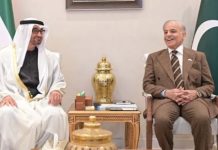WASHINGTON: Finance Minister Miftah Ismail said on Tuesday that Pakistan would buy oil and food from Russia at cheaper rates if it was offered and if it did not invoke sanctions against Islamabad. However, he clarified that so far, Moscow had not made such an offer.
In an interview to CNN’s Becky Anderson, Mr Ismail said that Moscow had not even responded to the previous government’s letter seeking to buy cheaper oil from Russia.
The finance minister also said that the present government would have gone for early elections if the economy allowed it to do so, but in the present circumstances its first duty was to stabilise country’s finances.
When asked about the option of buying oil and wheat from Russia, Mr Ismail said the two sides had talked about it, but since Russia is under sanctions, and they have not yet responded to the request sent by the PTI government, there was no movement on this front.
However, he said Islamabad had approached both Ukraine and Russia, “whichever country is willing to sell us wheat we would be happy to buy it.””Russia has also not offered us any oil and it is now under sanctions, so it’s very difficult for me to imagine buying Russian oil.”
When asked about the possibility of making the payment in rubles, as Moscow is demanding other states to do, Mr Ismail said: “Pakistan does not have any rubles. I don’t know where I would get the rubles from. I guess I could exchange it with some other currency. But first Russia has to agree to sell us oil because they haven’t.”
CNN then played a tape of its interview with former Prime Minister Imran Khan, where he claimed that Russia had offered Pakistan a 30 percent discount on oil and wheat imports.
Commenting on Mr. Khan’s claim, the finance minister said: “Russia did not offer a 30 per cent discount on oil or wheat. That’s clear. I don’t know where Khan gets his numbers from. But I know that he just makes up stuff as he goes along.”
Asked about the government’s negotiations with the IMF, Mr. Ismail said: “We have had talks with the IMF in Doha recently. We are talking to the IMF and particularly the IMF is looking at the budget that I am going to present in early June and after that, I am hoping that we will reach an agreement with the Fund.” He said the IMF was looking for Pakistan to reverse the subsidies on oil – petrol and diesel in particular – that the previous government had given.”
The IMF also wanted Islamabad to reverse electric tariff subsidies that the previous government had done in contravention to its own agreement with the Fund, he added.
“Then it is looking at the budget that I will present. So, I am pretty confident that we should be able to get an agreement with the Fund but there would be some austerity in the budget, some measures to increase taxation in the next budget.”
He claimed that raising oil prices was “a trap for us.”
“Imran Khan in the last days of his government did a few things to violate all these agreements with the IMF, including giving these unsustainably high subsidies. And he knew we could not sustain this.”
“And when we came to power, he is now going city to city, trying to rally the people with his theories about conspiracies and all that for putting a lot of political pressure on us.” The new government, he said, was finding it difficult to raise the prices right away, but it took a very important step last week.
When asked about Pakistan’s relations with China, Russia, and Saudi Arabia, he blamed Imran Khan for damaging relations with China. “He rolled back CPEC. He also annoyed Saudis and the UAE. We are trying to improve relations with them as well and with all the Western countries as they are the biggest importers of Pakistani goods, along with the US.”












